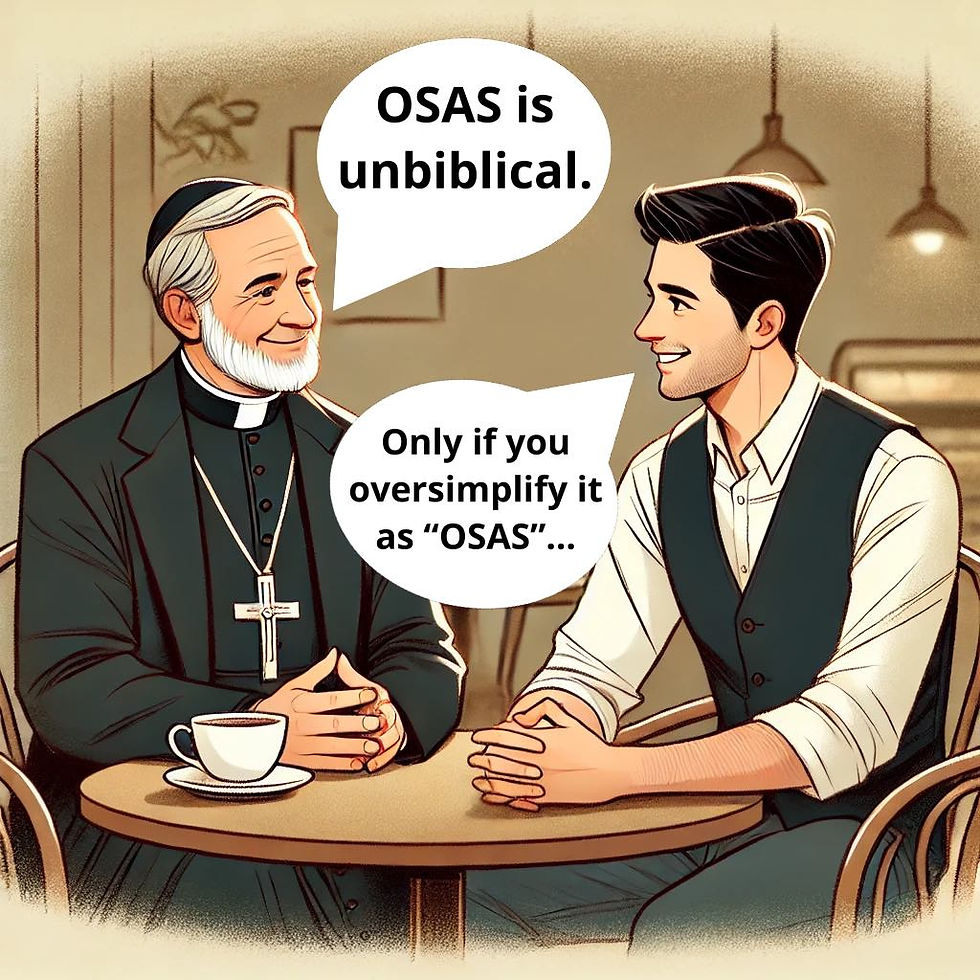Calvinism gives an excuse where none ought to be
- Bible Brian

- Aug 9, 2021
- 3 min read
Updated: Jul 31, 2023

In my opinion, the greatest flaw in Calvinism is that it ultimately shifts the blame of a man's condemnation from the man himself straight to God. The Bible makes it very clear that though sin is human nature, we are 100% responsible for it. Nothing, least of all God, forces us to sin.
This includes sins like blasphemy, idolatry, atheism, and anything else that stops a man from coming to Christ. God actually makes it quite clear that not only does He want all men to be saved and come to the knowledge of the truth (1 Timothy 2:4), wanting none of them to perish (2 Peter 3:9), but He also takes so many measures to ensure we can do this that when we don't take them, that's entirely on us. We can't say "of course I didn't repent and believe, you never gave me that ability". We can't even say "the devil made me do it". If any man rejects the will of God, which Luke 7:30 not only tells us is possible, but that people actually did, then this is entirely on them.
The trouble with Calvinism is that, taking all 5 points of TULIP together, one must conclude that the verses discussed in this article are wrong. It must be the case that God does not want all men to be saved and come to the knowledge of the truth, and that He does want some to perish rather than repent. It must be the case that the Pharisees did not reject the will of God for themselves, as Luke clearly tells us. It must be the case that unbelievers do have an excuse for rejecting the Gospel. Calvinism, because of these inconsistencies, can therefore never be true.
-----------------------------------------------------------------------------------------------------------------------
An attempted response from a Calvinist
When this article was originally published as a post on the Path Treader MinistriesFacebook page, a Calvinist attempted to respond with the following:
"In Calvinism, man is still willfully disobedient to God and fully responsible for their sin. God actively saves His people and let's others be."
I asked him in reply:
"Willfully disobedient, huh? So, in Calvinism, when God commands all men, everywhere, to repent, a man CAN obey that of His own free will?"
His response was:
"No, because the will isn't free. Man is willfully hostile to God, but that doesn't mean a person's will is free.
Part of the point of The Law is to show us what is sin and what is holiness. Sacrifices were commanded to show that we can't obtain holiness on our own and that it's only through the perfect sacrifice of Jesus that we can have holiness imputed to us.
God could have said that to be holy, we have to be able to jump and arm-flap our way to the moon and back, but that doesn't mean we can accomplish it. Holiness is a perfect standard we can't attain because we aren't capable on our own. In fact, we aren't even willing to pursue God naturally-speaking.
Philippians 2:12–13 (ESV): Therefore, my beloved, as you have always obeyed, so now, not only as in my presence but much more in my absence, work out your own salvation with fear and trembling, for it is God who works in you, both to will and to work for his good pleasure."
With this answer, the Calvinist proved my initial point. Ignoring his comments on the purpose of the law, which I agree with, he admitted that in Calvinism, man is not free to not be hostile to God. Thus, man has an excuse for that hostility. If man's will is not free, it is controlled by an external force. Yet, what other forces are there? If man does not have free will, the only possibility is that God controls our will. Thus, God is directly responsible for our hostility to Him. This cannot be so, for James tells us "Let no man say when he is tempted, I am tempted of God: for God cannot be tempted with evil, neither tempteth he any man:" (James 1:13, KJV). This is only true if we have free will. If we are not free to choose to obey God, especially given that one of those commands is that all men, everywhere, repent (Acts 17:30), then God is not only tempting us to sin, but actually forcing us. If, by contrast, we have free will, we can repent, and if we choose not to, that is 100% on us. Therefore, the fact that God says we have no excuse for our disobedience means we have free will.






Comments